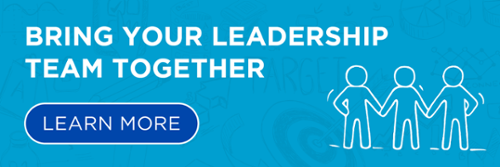
As a leader, your role is critical in ensuring the success of your team. You are responsible for setting the tone, building relationships, maintaining accountability, and driving results.
But equally important in ensuring the success of the team is the team themselves. Their relationships, communication skills, and collaboration efforts have a huge overall impact. Strong teams outperform others by 20%, and companies with a positive team culture see a 31% increase in employee productivity.
When it comes to strong teams, there are five key things that separate the best from the rest: cohesive communication, conflict resolution, impactful listening, collaboration, and trust. As we walk through each one, take the opportunity to reflect on the relationships, thoughts, and interactions of your current team.
Where is there room for growth?
Cohesive Communication
 Clear and effective communication is essential in every strong team. Communication breakdowns can lead to misunderstandings, frustrations, and overall decreased productivity. To ensure cohesive communication within your team, it’s critical to establish a high level of psychological safety. As a leader, this begins with you.
Clear and effective communication is essential in every strong team. Communication breakdowns can lead to misunderstandings, frustrations, and overall decreased productivity. To ensure cohesive communication within your team, it’s critical to establish a high level of psychological safety. As a leader, this begins with you.
Psychological safety is the shared belief held by members of a team that they won’t be embarrassed, rejected, punished, or humiliated for speaking up. Team members can openly voice ideas, questions, concerns, or mistakes. To promote psychological safety, model open and transparent dialogue. Always speak human to human by being vulnerable and admitting your mistakes. And encourage empathy – really take the time to try to understand the perspectives and feelings of others.
Here are a few questions to ask yourself and your team to help gauge your current level of psychological safety:
- Do you feel safe to speak up at work with your ideas, questions, concerns, or mistakes without the fear of being punished or humiliated?
- When encountering others' ideas, questions, concerns, or mistakes, do you use empathy to ensure they feel comfortable sharing their thoughts with you?
- Do you look at disagreements as a way to gain a deeper understanding of the other person's opinions?
Psychological safety isn’t a “one and done.” Much like relationships, it constantly evolves and changes over time based on the example you set, the composition of your team, and the day-to-day interactions that occur.
Conflict Resolution
As Ronald Reagan famously said, “Peace is not the absence of conflict; it is the ability to handle conflict by peaceful means.”
Of course, conflicts are a natural part of any team. How your team handles the conflicts that arise makes all the difference. It's important to approach conflicts with a solution-focused mindset, but different conflicts require different styles of conflict resolution. Sometimes conflicts require a “winner” and a “loser,” but sometimes it’s okay to compromise and allow both parties to walk away with half of what they desire. Other times, it may be best to set the conflict aside entirely until both parties have gathered their thoughts.
Strong teams consistently identify the best style of conflict resolution to use in each situation they encounter. They also understand their instinctual reactions when they feel as though someone has offended them, and they resist the urge they may have to “fight back.” Finally, they embrace psychological safety by practicing empathy and putting themselves in the other person’s shoes.
Here are a few questions surrounding conflict resolution to ask yourself and your team:
- When encountering a conflict, do you always identify the style of conflict resolution that will work best?
- Do you understand your instinctual reaction when you hear criticism?
- Do you try to look at the conflict through the other person’s perspective?
- After encountering a conflict, do you take time to reflect on the situation and identify any areas for growth?
Conflicts are an opportunity for growth and development. Much like rocks bumping and tumbling around in a rock polisher, conflict provides us the opportunity to come out on the other side, shining and strong.
Impactful Listening
You’ve probably heard the adage that the ability to listen is just as important as the ability to speak. But simply listening alone isn’t enough. The strongest teams always practice impactful listening: actively absorbing what someone says, showing genuine interest in what’s being said, and providing feedback that leads to growth.
It’s more than just hearing words. Impactful listeners pay attention to the nuances of language, tone, and body language. They make an effort to shut out distractions and provide full focus to the speaker. And circling back to psychological safety again – they always ensure they’re establishing a safe, comfortable environment where the speaker feels confident being themselves.
Listening is a skill and it requires development like any other skill. Great listeners do several things to demonstrate that they’re listening, and by doing so, they gather more information, provide better guidance, and increase the depth of their relationships.
Here are a few questions to ask yourself and your team to hone in on your listening skills:
- Do you always ask yourself what your mindset is before heading into a conversation?
- Do you maintain eye contact, turn off notifications, and avoid multitasking so you can give someone 100% of your focus every time?
- Do you ask questions to gain a deeper understanding of where the other person is coming from?
- Do you pay attention to your body language and make an effort to read the body language of others?
- Do you wait to provide your input until you’ve fully listened and understood what someone has to say?
Measuring the current listening skills on your team and setting goals for growth is a step in the right direction to increasing the strength of your team.
Collaboration
It goes without saying that the strongest teams effectively collaborate together. Oftentimes, collaboration exists, but it isn’t consistent. A few people on the team may work well together, but they don’t collaborate well with the rest of the team. Maybe one department is highly collaborative, but when it comes to cross-departmental projects, things don’t always go smoothly. Do either of those scenarios happen to sound familiar?
Collaboration is vital. Working together as a team, sharing ideas, resources, and best practices, allows you to accomplish more and deliver better results. Teams can leverage each other's strengths and better support one another in achieving their goals.
The tricky part about collaboration is that we’re all human. Everyone has unique workstyles and preferences. Some people like to grab onto a project and take action right away, while others prefer to know all of the details before beginning. Some prefer to look at the big picture and speculate the possibilities, while others want to ensure everyone’s feelings are taken into consideration before moving forward. Strong teams effectively collaborate together by being aware of their individual workstyles and the workstyles of each one of their team members.
Here are a few collaboration questions to ask yourself and your team:
- Do you know what your preferred workstyle is, and do you share it with others when collaborating?
- Do you know what the preferred workstyle is of those you’re collaborating with?
- Do you always take time to think about the impact your workstyle may have on others?
When everyone works together effectively, it fosters a positive and productive work environment that helps your team deliver the best possible results.
Trust
Last but certainly not least, trust is the foundation of a strong team. If your team doesn’t have trust, nothing else matters. Communication will be ineffective, conflicts will escalate, listening will fall by the wayside, and collaboration will be virtually nonexistent.
Trust is fragile. It’s built slowly over time, but it can be broken in an instant. To build trust within your team, every single person on the team must maintain integrity. Integrity is so vital in top-performing teams, that many of them have identified “Integrity” as one of their core values. They always hold each other accountable, admit their mistakes, and consistently follow through on commitments and promises.
Here are a few questions to gauge the level of trust in your team:
- Do you always follow through on the promises you’ve made?
- Do you hold other people accountable for the promises they’ve made?
- Do you always admit your mistakes, regardless of the consequences?
- Do you make a conscious effort to continually build trust with your team members?
Implementing trust-building activities when your team gathers together is a strong strategy to strengthen relationships.
Conclusion
Building strong teams requires a focus in all five of these areas: cohesive communication, conflict resolution, impactful listening, collaboration, and trust.
Most of our Up Your Culture blogs are geared towards leaders and managers, and while this blog is certainly important for leaders to read, we also encourage you to forward it to the members of your team. Ask for their responses to the question prompts, allow time for brainstorming together, and set a few group goals. Together, you can build a stronger team.










Leave a Comment